“Strange Bedfellows”
Written by Ronald D. Moore
Directed by Rene Auberjonois
Season 7, Episode 19
Production episode 40510-569
Original air date: April 21, 1999
Stardate: unknown
Station log: Oddly, the only scenes we get in the “last time” bit are the ones that establish that a) Worf and Dax were captured by the Breen and b) the Breen have allied with the Dominion. Worf and Dax are then taken away to a cell, and Damar is introduced to the Breen commander, Thot Gor, who is dismissive of the legate. The female changeling manages to make herself look not-flaky long enough to meet Thot Gor. Damar is very not happy at being kept out of the loop and even less happy that the treaty calls for territorial concessions to be made by Cardassia to the Breen, but doesn’t specify what those concessions are to be. Damar’s also peevish because the Klingons are attacking Septimus III and the Cardassian forces there need reinforcements. Weyoun says he’ll handle it, which he says with all the sincerity of a used-car salesman, and all the specifics of the treaty with the Breen.
On DS9, Martok and Sisko discuss the two wars—the one against the Dominion as well as what Martok refers to as the one at home, specifically marriage. The general refers to his marriage to Sirella as a long, brutal, intoxicating war and says that Sisko’s in for the same now. As if to prove the point, Yates returns from her cargo run to discover that, as the wife of the Emissary, she’s expected to perform a ceremony that blesses all the Bajoran women who wish to have children. Yates very emphatically refuses.
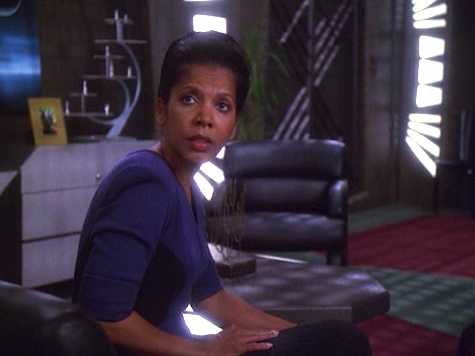
Elsewhere, Winn and Dukat-as-Anjohl have pillow talk on the subject of the Restoration and how they won’t let Sisko stand in their way. There’s no actual evil cackling or twirling of mustaches, but it’s implied.
The Dominion has Worf and Dax hanging upside down from the ceiling because why not. Eventually, they are allowed to walk on the floor again, though their attempt to loosen a pin from the bunk devolves into yet another bickering session, which is mercifully interrupted by Weyoun and Damar. Weyoun makes them an offer: help them sort through the chaotic information provided by the Breen mental probes, or be turned over to Damar for a Cardassian show trial that will end in their executions. While trying to convince them, Weyoun makes reference to Dax’s as-yet-unexpressed feelings for Bashir, which prompts Worf to snap Weyoun’s neck. This gives Damar a good laugh, and he tells Worf that they’ll just make another one.
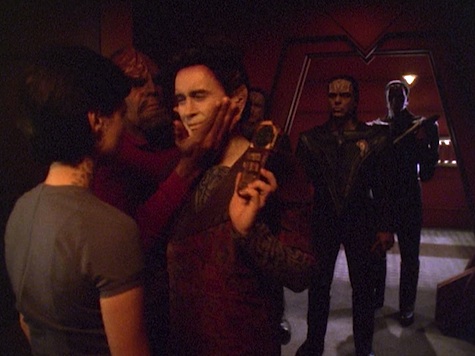
Winn’s attempt to find out more about “Anjohl” is interrupted by another vision, but this time the Pah-wraiths are up-front and say that the Restoration isn’t of Bajor, but of them to the Celestial Temple. Devastated, Winn instructs Dukat to have Solbor bring her the Orb from the temple on the station.
Weyoun #8 meets with Damar, who is still greatly amused by Weyoun #7’s fate. Damar informs him that the prisoners’ execution is scheduled for 1400 the next day, and when he says that they haven’t agreed to cooperate, Damar chortles as he suggests that Weyoun try talking to Worf again.
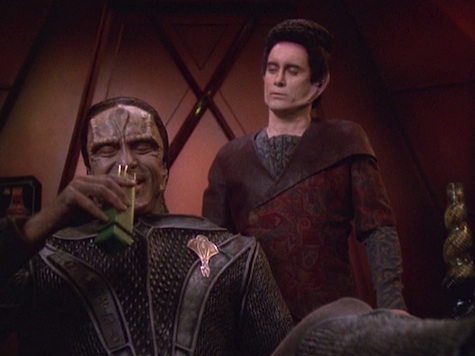
Thot Gor and several Breen aides join the conversation, at which point Damar is much less jovial, especially once the Breen are given full access to Cardassian military databases. Weyoun also informs Damar that all military strategies will go through Thot Gor and he will pass them on to the Founder.
Solbor brings the Orb of Prophecy to Winn. But when she exposes herself to it, nothing happens. She believes that the Prophets have forsaken her because she was in communication with the Pah-wraiths. At this point, Dukat lets the other shoe drop, saying that he came to Winn because of a vision he got from “the true gods of Bajor,” the Pah-wraiths. He does the Pah-wraith sales pitch, saying that they’ll give her what she wants, unlike the Prophets who turned their backs on Bajor during the occupation, who appointed an alien Emissary.
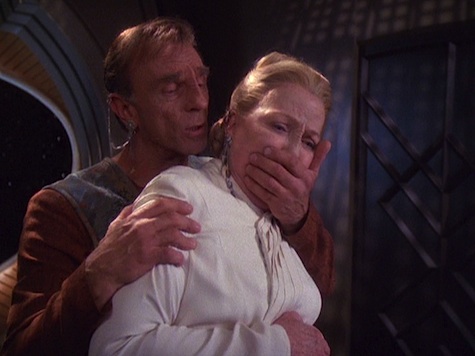
Winn, however, isn’t buying it, and she kicks “Anjohl” out. Dukat’s parting shot is to tell her that she’s damning herself to a life in Sisko’s shadow. Winn pleads with the Prophets to give her a sign, but they remain silent. So she summons Kira to her quarters and bares her soul, saying that Kira was right to disapprove of Winn all these years. Kira says Winn should get rid of the things that led her on this disastrous path: her ambition, her political machinations. But Kira is talking about her stepping down as kai, and Winn absolutely refuses to take that step. Bajor needs her after all.
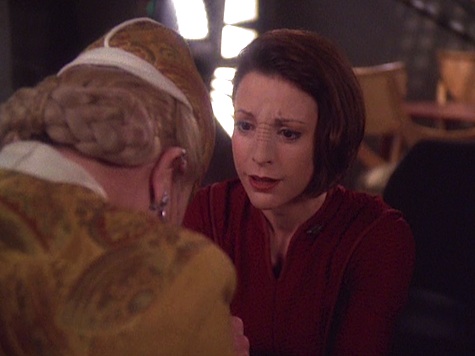
Damar is livid to realize that Septimus III has fallen to the Klingons. Weyoun sent no reinforcements, and 500,000 Cardassians died. To Weyoun it was a strategic victory: the Klingons committed a ton of their forces to a comparatively insignificant world. To Damar, it’s the latest in a series of sacrifices made by Cardassians on behalf of the Dominion, something Weyoun thinks he should be honored by. Damar storms out and goes to his quarters to pour himself yet another kanar. But he only takes one shot—the second he tosses at a mirror, so he doesn’t have to look at himself.
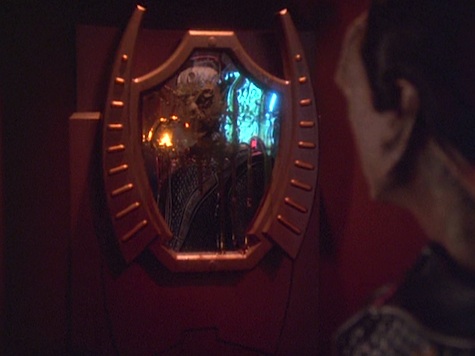
Worf and Dax manage to escape their cell, but are recaptured in short order. They have their first honest conversation, with Dax getting Worf to admit that he feels guilty for not loving Ezri the way he loved Jadzia. Dax admits to the same thing, and they bury the hatchet and agree to be friends—and more—for the few minutes they have left. After they come to their rapprochement, Damar comes for them, accompanied by two Jem’Hadar guards—
—whom Damar then shoots. He gives the Jem’Hadar’s rifles to Worf and Dax and tells them there’s a Cardassian ship preprogrammed to get them back to Deep Space 9. He wants them to deliver a message to the Federation: they have a friend on Cardassia.
Weyoun is livid, but Damar blames the Jem’Hadar whom Weyoun insisted be left in charge of the detention area after Worf and Dax’s escape attempt. The female changeling then summons Weyoun to report to her. Damar says that he’s sure the Founder will understand—and if she doesn’t, he looks forward to meeting Weyoun #9.
Winn summons Dukat to her quarters, admitting for the first time that she never felt anything from the Prophets, not even when she first saw the wormhole open. Fed up with serving gods who refuse to give her anything in return, she drinks the Pah-wraith Kool-Aid, with “Anjohl” by her side, ready to take on the universe on their behalf.
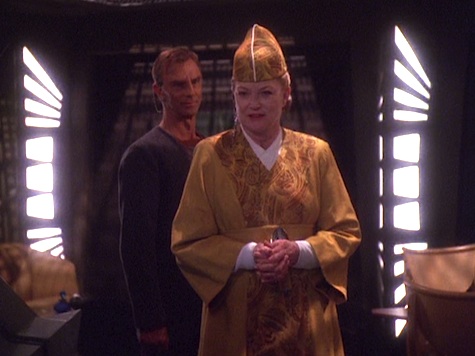
The Sisko is of Bajor: Yates starts to learn what it means to be the wife of the Emissary, not only in her presence being requested at rituals, but also her Bajoran crewmembers are treating her completely differently now, even though they’ve known her for ten years or more.
Don’t ask my opinion next time: Winn goes to Kira for advice on what to do, giving Kira the ideal opportunity to get rid of a bad kai under the guise of good advice. Sadly, Winn doesn’t see it as good advice, because that would mean giving up power, and she’s not about to do that…
The slug in your belly: As they’re about to be executed, Dax expresses annoyance to Worf that the only legacy that Ezri Tigan will bring to three centuries of Dax will be to end it.
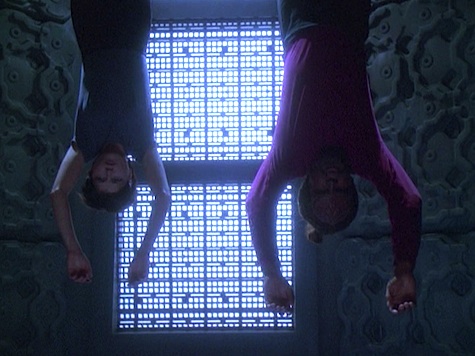
There is no honor in being pummeled: Worf tells Dax what we’ve all known since “The Emissary” on TNG: he doesn’t believe in casual sex, but rather that intercourse is a deeply spiritual bond between people who love each other. He also admits that what he did with Dax before the Breen captured them was, er, not spiritual.
Rules of Acquisition: Since Dax and Worf’s disappearance, Quark has been regularly putting out Dax’s usual beverage at the usual time that she drinks it, in the hopes that eventually she will be there to have it.
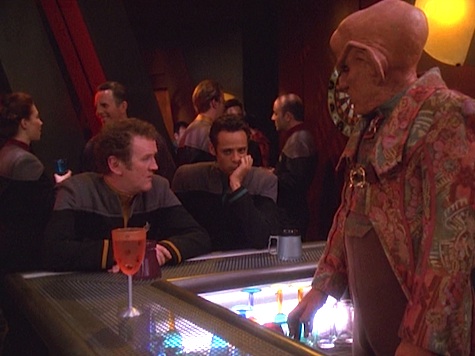
No sex, please, we’re Starfleet: Dax admits that her feelings for Bashir were all in her subconscious mind, and Worf and Dax both admit that having sex was a spectacularly stupid thing for them to do, based on memories of past lives instead of anything in their current ones. Oh, and Dukat and Winn are eating fruit in bed together, which is adorable in a skin-crawling kind of way.
For Cardassia! Damar semi-officially begins the Cardassian resistance by freeing Worf and Dax and giving them the means to return to DS9 and a) report the Breen alliance and b) let the Federation know that Damar is rebelling. (I was going to say, “Damar is revolting,” but some jokes are just too obvious…)
Victory is life: For their initial meeting, at least, the female changeling is unwilling to let the Breen or Damar see how badly the disease has ravaged her. In this new alliance, the Breen obviously have a superior position to that of the Cardassians.
Keep your ears open: “Why should we trust you?”
“You can either trust me, or you can stay here and be executed.”
“I vote for option one.”
Worf not trusting Damar, Damar pointing out why that’s stupid, and Dax agreeing with Damar.
Welcome aboard: Recurring regulars Marc Alaimo (the disguised Dukat), Casey Biggs (Damar), Jeffrey Combs (two different Weyouns), Louise Fletcher (Winn), J.G. Hertzler (Martok), Salome Jens (the female changeling), and Penny Johnson (Yates) are all here, plus James Otis returns as Solbor.
Trivial matters: The original title of this episode was “Eclipse,” which made a nice troika with “Penumbra” and “Umbra” (the latter being the original title of “’Til Death Do Us Part”). The titles were changed when the Sisko-Yates wedding was moved from this episode to the previous one.
Ira Steven Behr, Hans Beimler, and Rene Echevarria all worked on this script as well because Ronald D. Moore’s wife went into labor a month earlier than expected, and he needed to take a week off.
Walk with the Prophets: “I’m glad to see you find the death of my predecessor so amusing.” It’s interesting, I find myself much better disposed toward this episode than I do “’Til Death Do Us Part,” even though it has many of the same problems. I think there are two reasons for this. One is that Ronald D. Moore is about a billion times better at dialogue than David Weddle and Bradley Thompson. There are many great lines in here, from Dax’s musing on how hanging upside down is good for her back, to the endless well of amusement that Weyoun #7’s death provides for Damar.
The other reason is that plots actually move forward substantially this time around. We’ve had Damar chafing under Weyoun’s thumb all season, we’ve had Worf and Dax being super-awkward and bickering with each other all season, and we’ve had Dukat playing Winn for just one episode, but all three move forward significantly and importantly in this episode.
Damar finally stops drinking and addresses why he’s drinking. After all, Worf killing Weyoun (which was, by the way, a great moment) was the only thing that Damar has actually enjoyed since being promoted to legate. And so he finally makes the decision to go against his oppressors, to go against the people who have been gleefully sacrificing Cardassian lives to fight their war.
Worf and Dax also finally have the talk they should have had an episode ago (or better yet, several episodes ago), hashing out the awkwardness and weirdness of being thrown together in this situation. It’s something that Worf is ill-equipped to deal with—he’s had people in his life die (his parents, K’Ehleyr), but he’s never had them still be around, and especially not in such a unique way. It’s completely short-circuited his grieving process. On Dax’s end, Ezri wasn’t properly prepared for joining, so she had this intense memory of a great love, and no clue how to process it.
Of course, it would’ve been nice for them to get to this point sooner without all the endless, repetitive bickering, but we live in an imperfect world. At the very least, they got to that point, so, y’know, small favors.
And then we have Dukat and Winn. Parts of this work very well. Dukat plays his hand beautifully for one thing, and Winn’s great desire to be contrite and be forgiven lasting right up to the part where she has to give up her cushy-tushy job as kai, after which, the hell with that, is perfectly played by the always-excellent Louise Fletcher. Other parts really don’t, though, particularly the closing scene which had every single super-villain cliché and I just wanted to gag. It was as big a misstep as Sisko’s speech at the end of “Waltz,” reducing complex characters to mustache-twirling villains, which is a huge disservice to both characters, and an embarrassment to a show that has so often favored nuance. It’s especially disheartening to have it in the very same episode in which Damar makes such a major breakthrough. This is Damar, whose job in the fourth and fifth season was to be second Cardassian on the left, who’s become such a delightfully compelling character. It’s a triumphant moment when he tosses the kanar into the mirror—although I still love his guffaws when he suggests that Weyoun try talking to Worf again best—and Casey Biggs is simply amazing.
Still, things are changing: the Breen are now part of the Dominion’s fleet and their strategic process, Damar is becoming disillusioned, and Winn has (sigh) embraced the Pah-wraiths. Where the previous episode felt like stalling, there’s real forward motion here, and it comes along with some excellent scenes—and, sadly, some bad ones, especially that awful ending.
Warp factor rating: 7
Keith R.A. DeCandido has stories in two Spring 2015 anthologies (both edited by Jonathan Maberry and published by IDW) available for preorder: V-Wars: Night Terrors, the third in Maberry’s shared-world vampire anthology series with Keith’s story “Streets of Fire,” and The X-Files: Trust No One, the first of three licensed anthologies based on the TV show created by Chris Carter, with Keith’s story “Back in El Paso My Life Would be Worthless.”










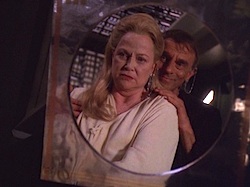
I’m only a few episodes ahead at this point (last one we watched was ‘Tacking Into the Wind’) but I actually don’t get all the Damar love…I will probably have more to say on that later. I don’t find his arc all that well developed or nuanced (yet, at least). But so far it seems the very standard ‘villain realizes bigger villain is screwing him over (shocker!) and so oppurtunistically decides to side with the heroes’. And I’m supposed to be sympathetic? Although there is some stuff in the last episode we watched that does hint to a little more development there so I guess I’ll have to sit tight.
The scenes with Weyoun (and his reaction to his death) were just perfect though :) I really like how they resolved Worf/Ezri here, and also that they were able to have Worf express his particular ideas about sex WITHOUT making him into an immature jerk over it.
I have to say, I really felt for Winn here, especially the scene where she is sitting in front of the Orb all night. I really wanted her to be able to do the right thing. I actually had the same thought at the end, that in a way they took a more extreme but less interesting route…although I can’t say her snap is not entirely believable…
And for a final time, Rene Auberjonois proves reluctant to do much acting while he’s directing. Only four of his nine episodes even get a “Preservation of mass” section in this rewatch, and each only for one scene, with only two actually being of much significance.
This episode marked the end of his directing career, and it’s for the better, as it freed him up to do more acting and voice work, since he doesn’t do both at once.
I agree about the strengths of the episode. While Winn’s degeneration into a pure villain these past two seasons (mainly at Weddle & Thompson’s hands) was disappointing, Moore did a great job of capturing the character as we used to know her, full of self-righteous piety that was ultimately a cloak for her overweening ambition. Here, whatever genuine goodness resided in her was struggling to assert itself and stand up for what was right, but once she realized that doing so would mean sacrificing her own self-interest, she wasn’t having any part of that.
And maybe Kira pushed too hard by coming right out with the “step down as Kai” thing. Maybe she let her own wish to get rid of Winn lead her into a mistake. If she’d tried a softer sell, she might’ve been able to keep Winn on the right path a while longer, enough to do some good.
This is definitely when Damar started getting really interesting. And his glee over Weyoun’s death was fantastic :)
I believed Winn’s embrace of the Pah-Wraiths. I saw it as the natural progression for her character (considering Dukat’s manipulations. She wouldn’t have gotten there on her own). She’s always been on the edge morally–she wants to be a good person and do good things, but ultimately what matters to her is power. All of her previous attempted good works were tainted by her pride and lust for power. Her ultimate problem is pride–She cannot humble herself and accept that perhaps the best thing she could do is step down. Since the most important thing to her is power and her own self-important pride, it is natural that she would abandon the Prophets to worship the Pah-Wraiths. The Pah-Wraiths flatter her and have special plans for her (or so Dukat says). So in a weird way I felt like putting Dukat and Winn together completely worked, because both of them will stop at nothing to vindicate themselves in their own eyes. Neither of them could bear the reality of their own moral bankruptcy, so they simply keep twisting the facts to create scenarios where everything they’ve ever done was justified.
That said, it still made me sad to see Winn choose power over her faith. I feel like that was her turning point and I wanted her to make the right choice.
Aside from the neck snapping, one of my other favourite moments is during Dax and Worf’s abortive escape attempt. They’re running down the corridor, Worf gets shot in the leg, shouts “Leave me!” and Dax just rolls her eyes and says “Oh, shut up.” One of the best things about Ezri is that she has no time whatsoever for Worf’s Klingon pretensions in the way Jadzia did.
There’s also a great scene in the script that either went unfilmed or was cut before broadcast. Kasidy, after refusing to do the ritual for Bajoran mothers, does eventually go through with it. But she does it completely on her terms. She turns up late and basically turns the whole thing into a very human coffee klatch, while still giving the Bajoran mothers what they wanted by spending time with them. I liked that about Kasidy and was sad that scene didn’t make it into the episode. I like to think it would be in the novelization.
@3 – I agree about the sell. People want to change and improve, but they struggle with the idea of admitting to others that they have failed. For Winn, with her the piety expected of her position, and the broad visibility, it would mean making that admission to so many whose respect she had spent years working towards. A soft sell of working internally, and later mentioning a public admittance of failure would have been more successful. But I have hindsight to help me. If also doesn’t help that Kora has a history of butting heads with Winn. I suspect that if she had gone to Solbor, the outcome would have been very different.
This also raises a question of foreordination or predestination. If the Wormhole Aliens speak to her, she doesn’t go back to the Cave Aliens. But, the Wormhole Aloens know how this will end and need the Cave Aliens to be defeated. Does that mean that the Wormhole Aliens intentionally antagonized Winn to drive her to the loving arms of Dukat and the Cave Aliens?
I was also entertained by the comparison of marriage to war. In my marriage, we have little battles on a regular basis, which the missus usually wins, that do make it fun. It’s entertaining to see how my perspective on that discussion changed from my initial pre-marriage viewing, to early marriage, to many years later. Two nits, though. One, this isn’t Sisko’s first marriage. Shouldn’t he have been familiar with Martok’s observations? Two, Yates knew who she was marrying. It’d be like marrying the POTUS and then being surprised that now you’re a public figure. Sure you might not of consented to it, but you knew it came with the territory. Not sure why the advice request was a surprise. Also a little bothered that she was telling Sisko that she wanted to be part of his life, but not the Bajorans part that makes up his birth and really half of his existence.
@5 – culture and religion being so intertwined, I can’t tell if the ceremony is religious or cultural. Either way, but to me more so if religious, that would have bothered me more than her working for the Maquis. If you aren’t going to perform the ceremony, fine, it’s an Emissary duty anyway (although, who would have done it before Sidko?). But to change a ceremony to suit your on whims? Unacceptable.
The only possible workaround I can see is if it was something Sisko invented, and was thus not a Bajorans ceremony, but a Sisko ceremony. But, it sure didn’t sound that way from the dialogue.
@5,7 – I agree with Rancho. I actually think it was good that Kasidy stood her ground and said, no, I’m not going to do this. I don’t think it’s incumbent on her to perform rituals in a religion she does not have faith in (I don’t think that has to mean she isn’t a part of Sisko’s life fully) and as a religious person myself, I would vastly respect that more than her trying to change it or trivialize it.
I had the same thought about Kira – even though stepping down would be the right thing for Winn to do…baby steps. Really, that was a very courageous moment for Winn, in a way, and so perhaps should have been handled more delicately. She was on a tipping point (this almost brings to mind some letters of Tolkien’s that muse that it’s possible Samwise, dsepite being a hero in general, was a huge stumbling block for Gollum and may have pushed him to tip back to evil when he was on the verge of repenting). Of course, Kira tends to go in for things full throttle…(not to mention her own biases towards Winn).
The episode that made me a Damar fan. His laughing over Weyoun’s death is probably Star Trek’s best moment of dark humor, not that there are many.
Whenever Wynn and Kira are on camera at the same time, I always have a problem: I dislike them both equally. I’m supposed to dislike Wynn so that’s how it’s meant but Kira has always been my least fave character in the series. With her yelling, her never-ending Resistance nostalgia, her constantly having to learn the same lesson over and over (“Not all Cardassians are bad, got it, oops there it goes again”), she irritates the hell out of me. Not a comment on Visitor, by the way – it’s the way Kira is written. (Matter of fact, Intendent Kira is my fave part of the MU episodes which I otherwise don’t care for.)
My ex-roomie had a “Go Team Lizard!” t-shirt from her high school days and I always think of when Kira gets extended view time since I’m cheering for the Cardassians all the way.
Long way of saying: yeah, Kira didn’t handle the Kai right at all.
Winn’s “conversion” always makes me think of the unfortunate nature of the baby-steps that DS9 took into dealing with religion (versus the usual Roddenberry Space Atheism), since so much of the real philosophical meat of what could have been done with the Phophets and Founders (and would have been likely done if the series was being done today) wasn’t tried. Here we’re seeing the ur-portrayal of the Dark Night of the Soul and spiritual desolation (complete with The Temptor offering fake spiritual consolation), but it’s written as Stan Lee instead of John of the Cross.
DS9 remains by a millions longshots my favorite Star Trek, but it’s funny how the very things I like about it – its daring to approach war and religion – are things that it just never *quite* gets right, being a product of its age at the very beginnings of the transition to serial vs. episodic storytelling in such programs.
Winn’s almost-redemptive arc, where her good side is so close to breaking free, until she actually considers what the personal consequences would be, is heartbreakingly believable. (Unlike the melodramatic mustache-twirling that follows.)
Yes, Kira really should have gone with baby steps — but it’s Kira. She’s a decisive person, with no guile. If she were somehow in Winn’s position and trying to repent, she would do it cold-turkey stepping down as Kai without any baby steps. And really, Winn should have known this aspect of Kira’s personality well enough to know that Kira wasn’t the right person for her to ask.
In that sense, Kira in this scene gets more of a pass from me than Samwise in his relationship with Gollum. There’s a “well, you did ask” aspect. (Also, without wanting to stir up any controversy, I’d just like to say it’s interesting to compare this scene to Mark 10:17-22.)
Neck-snapping = awesome — I particularly love that it happened so abruptly, without the usual dramatic buildup to the death of a major character.
Damar’s beginning of dramatic development = awesome. No more whiny two-way tantrums between Worf & Ezri = awesome. “Oh, shut up” = awesome.
@12: I can’t ever see the death of Weyoun as particularly significant, because you know there’s going to be another one in five minutes anyway.
I think the death of Weyoun #7 was significant because of Damar’s reaction, which along with his drinking is showing us how his character and loyalties are changing. He doesn’t mind seeing his ally dead and even gets a couple of good laughs from it.
@14: Fair point – I was only referring to McKay’s comment in @12 about the lack of build-up. I don’t feel like I need one with Weyouns, because I know they’re being instantly replaced. It’s not that the death is unimportant to the storyline, but the presentation of it doesn’t matter as much.
True, it would have been kinda silly for them to make a bigger deal of this particular death. But still, the abruptness gave me a new level of respect for Worf’s dangerousness, which I liked.
So then, did Worf snap Weyoun’s neck because he knew he could vent his rage with no significant consequences? Or did he do it because he was just that angry about the threat to Ezri? In other words, was he always a hair away from a casual neck-snapping when he was security chief on the Enterprise, or is Weyoun a special case because he’s replaceable?
I’m not sure which I’d prefer, to be honest. But Damar’s right, it’s darned funny. Which is not something I ever thought I’d say about a snapped neck.
@17- I wouldn’t call it casual, but Damar’s conversation suggests that Worf wasn’t aware (although, he should have been, since the station already knew about the cloning and multiple Weyouns from things like Odo’s good Weyoun experience). Besides, I don’t recall anybody on the Enterprise torturing him and his wife’s former half-body’s new half-body (does the symbiont feel the pain or just have an awareness of it?).
bmacdonald: Keep in mind that, by the time Worf snapped Weyoun’s neck, Worf had been 1) in a firefight that destroyed the ship he was commanding, 2) stuck in an escape pod that was being ping-ponged around the Badlands for days, 3) rescued only to have the runabout that rescued him get in a firefight and crash, 4) stuck on a planet with minimal supplies for six days, 5) taken prisoner by a hostile power and tortured, 6) transferred to another hostile power (well, okay, now another part of the same one, but that just happened) and hung upside down from the ceiling.
I think he can be forgiven for being a bit, shall we say, raw from all that and less able to curb his nastier impulses……
—Keith R.A. DeCandido
“Since Dax and Worf’s disappearance, Quark has been regularly putting out Dax’s usual beverage at the usual time that she drinks it, in the hopes that eventually she will be there to have it.”
He has, of course, been adding this to her tab. He’s sweet, not stupid.
@17 & 19 – add to that he has just been told that if he doesn’t co-operate he will be executed. He knows he isn’t going to co-operate, so as far as he is concerned, he is dead anyway. How are they going to punish him for killing Wayoun, kill him again? Even if they make it a more painful death, Worf is just going to see that as more honourable and more likely to get him to Sto-vo-kor. I found it a very believable reaction from a character like Worf, and Damar’s reaction to that was really the icing on the cake.
Maybe it was just a difference in the material that he was given, but I had a sense that Jeffery Combs was playing Weyoun 7 slightly differently than he played Weyoun 5, and I felt that was a nice touch, if it wasn’t totally imagined. And then I even felt that #8 came in and was played somewhere inbetween the two…again, not sure if that is just my imagination or not.
Agreed about Damar – after being practically part of the background for a few seasons, I think Casey Biggs does a tremendous job with him in these last few episodes. Real pity that it took so long, and couldn’t go further.
Lisamarie: Thinking about it, I’m not sure if I’d call him villainous. Certainly not *nice*, and not harmless, but… I guess I see him as Rommel to Dukat’s (or perhaps more appropriately, Weyoun’s/the Domninion’s) Hitler – proud of his homeland and people, willing to fight for them (which, yeah, will result in casualties on ‘our’ side); but disapproving of the government or philosophy that’s overtaken them and compels him to fight, expressing more ‘honour’ and ‘humanity’ than said government ever would (if that doesn’t sound too paradoxical or repugnant in terms of fighting a war), and in the end taking steps to rebel against it.
@17. I can just see it now:
“Stardate 43172.4: Chief Security Officer’s Log: Uss Enterprise:
Made it through another day without killing Wesley. This feat of endurance will surely pay my fee to Sto-Vo-Kor.”
I’m glad that Damar finally starts his change from evil guy’s sidekick to hero. I don’t think he was ever in this for bad reasons; he was a true Cardassian patriot and though he did a lot of bad stuff, his whole redemption arc is now starting, thank goodness. Love Casey Biggs!
@25, Yeah, there’s this interesting parallel between Damar and Garak that I don’t think was every really explored on-screen (I think Una McCormack dealt with somewhat in “Face Value”).
They’re both, at their cores, Cardassian patriots.
I think there are two reasons for this. One is that Ronald D. Moore is about a billion times better at dialogue than David Weddle and Bradley Thompson.
You gotta hand it to Ron Moore, though. He was a firm supporter of Thompson and Weddle as writers. Throughout DS9’s run, both Moore and René Echevarria always helped those two with their scripts. And then Ron gave them another shot with Battlestar Galactica, which pretty much cemented a prolific TV writing career for the both of them that continues to this day.
Strange Bedfellows works pretty well as a transitional piece, only this time we finally get some much needed payoff. Particularly when it comes to Worf and Dax. I never realized how many parallels you could draw with Worf and overly traditional men who feel they’re entitled to marry a woman in order to protect her ‘honor’, using whatever religious and moral BS as an excuse. The concept feels outdated today. Imagine in 2375. Then again, Worf’s a Klingon, and one who takes everything very seriously.
I’d argue that Damar’s been suffering under Dominion rule for far longer, even when Dukat was still the boss. That’s closer to two years.
And also, I often wonder if part of the reasoning behind Damar’s drinking had to do with his murdering Ziyal. He may have been a hardcore Dukat loyalist and Cardassian nationalist, but I don’t believe he never felt remorse over what he did. Of course, that’s not the only reason he drank, after all Quark was already getting him drunk during DS9’s season 6 occupation.
I certainly don’t see Damar as villanous. I see him as a Cardassian who spent his whole life being taught to love his mother nation like a hardcore nationalist. I assume he worshipped his father as such (a father who was probably very strict in his upbringing), and then transferred that loyalty to Dukat when he recruited him.
@27: “You gotta hand it to Ron Moore, though. He was a firm supporter of Thompson and Weddle as writers.”
Maybe, but I have to wonder why, since they just weren’t on the same level as the rest of the DS9 staff. Nor was I impressed by their Galactica work.
@23, 25, 26, 27
First, I also love Casey Biggs, he’s great. This is nothing against the actor.
Second, agreed he is a complex character. But I would not discount him from being villanious. For one thing, I don’t count patriotism as a virtue, especially when the patriotism is for a country doing the horrible things Cardassia is doing. It’s a complicated thing – I can understand loving your country, loving its culture/arts, being raised that way, and all that…but he was still involved in some way with all that (and I’m not even saying I’d do any better in that situation).
I could just not be remembering, but I don’t recall him expressing any dissatisfaction with the government or Cardassia’s future until after the Dominion came along…(and again, I just might be completely blanking)…perhaps, had they been victorious, he would have been totally happy to lead in the subjugation of the Alpha Quadrant. Which is why, at THIS point, it just seems like he only comes around once he realizes he’s losing, not because he realizes he’s wrong. Or that the Dominion aren’t evil until they start being mean to HIS people. Again, not necessarily an unrealistic reaction, but I wouldn’t call it heroic.
Having seen the rest of the series (woo! no more spoilers!) I can see that he does begin to evolve a more mature moral compass and this is just a starting point, and that’s cool. But it actually makes me a bit wistful for what the series could have been – I actually found the politics betwen the Bajorans and Cardassians and the ways they had to adapt with the aftermath of the occupation – especially the collective guilt Cardassians may have felt – much more interesting than the Dominion War, and wish the series had focused more on that.
@29: Most people are neither heroes nor villains. They’re just trying to make the best choices they can in pursuit of their goals. Damar, like Garak, was a patriot. He did what he thought was best for his people. Although in Damar’s case, I think that for most of the series, he was just going along and trying to do his duty, to follow orders, but he increasingly found those orders weighing on his conscience. Now, “hero” is probably too strong a word for someone who belatedly tries to make amends for doing the wrong thing — but much villainy is the work of people who never start listening to their consciences at all.
Agree with CLB. Damar is definitely in one of those shades of grey (not tryong to dredge up memories of a terrible episode, sorry). Damar comes around realizing that his goals and those of the Dominion are not the same, and the price of millions of Cardassian lives is too damn high.
“Maybe you should talk to Worf again…” I laugh everytime I remember that line, and Damar laughing over Weyoun 7’s corpse. “You should have killed me, Klingon; they’ll just make another one of him…”
Kasidy justifiedly doesn’t want to do a ceremony Sisko suddenly springs on her, in response he passive-aggressively pours Tabasco or whatever over their food because of the “war of marriage” or some other unhealthy, damaging Klingon idea, and no one here even mentions it? Wow.
My husband and I are often commenting about how nobody on the writing stuff must have a really happy marriage, mostly based on Miles and Keiko (she was 3 hours away for months, and he never once visited her?!), but this cemented it.
That doesn’t follow. Drama is driven by conflict, so writers will invent conflict for their characters even if their own lives are happy. The whole point of fiction is that it’s made up, so it doesn’t make sense to assume it reflects the creators’ real lives. I mean, the lives of my fictional characters rarely have much in common with my own, because my own life is boring.
I’m glad Ezri and Worf had time to talk things out. Much has been left unsaid between the two and it’s only now that I truly understand why Trill usually have a rule against meeting up with former loved ones. It’s just too confusing for the others, especially if they are non-Trill.
Other than that, is there any real reason why the female changeling still looks like Odo other than “It’s easier for the viewer”? It really doesn’t make sense anymore.
Also, it’s about time the Cardassians learned that “The Dominion” doesn’t care about anyone but themselves. If the Breen only had like half a brain they’d realize how the “allies” of the Dominion get treated.
What’s with all the cup filling and food prep in this episode? At least five scenes start with someone pouring a drink or prepping some food. Is it just to suggest the table is being set for DS9’s endgame?
It’s astonishing that Winn (or at least Solbor, who has major “butler in The Importance of Being Earnest” energy) didn’t think to Google “Anjohl” and check out his story. He made several claims about himself that would have been so easy to fact-check, if anyone had bothered.
Speaking of whom, under Bajoran naming convention, “Anjohl” should have been the fake surname Dukat was using, not his fake given name. So why does Winn call him that, instead of “Tennan”?
I really love Damar’s jovial, “Well, hello!” when the new Weyoun walks in, that was pretty great.